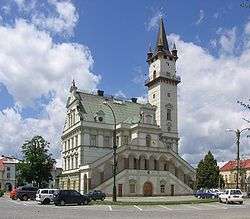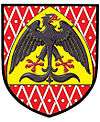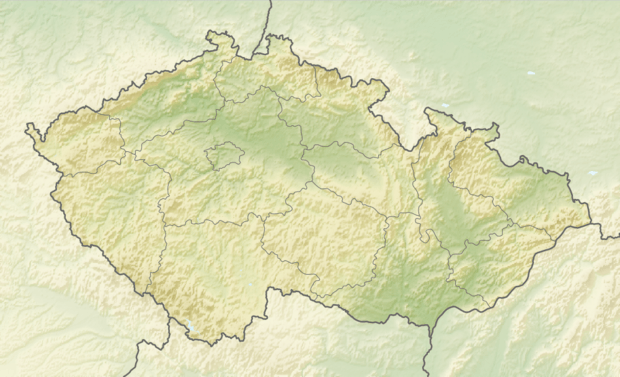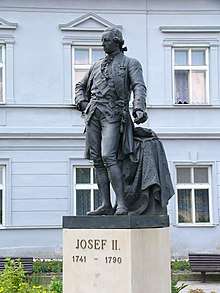Uničov
Uničov (Czech pronunciation: [ˈuɲɪtʃof]; German: Mährisch-Neustadt, Hanakian Oničov) is a town in the Olomouc Region of the Czech Republic. It is located in the historic Moravia region between the Plain of Hanakia and the Eastern Sudetes, about 22 km (14 mi) northwest of Olomouc. The town has around 11,500 inhabitants.
Uničov | |
|---|---|
Town | |
 Townhall | |
 Flag  Coat of arms | |
 Uničov Location in the Czech Republic | |
| Coordinates: 49°46′16″N 17°7′1″E | |
| Country | Czech Republic |
| Region | Olomouc |
| District | Olomouc |
| Founded | 1213 |
| Government | |
| • Mayor | Radek Vincour (ODS) |
| Area | |
| • Total | 48.27 km2 (18.64 sq mi) |
| Elevation | 248 m (814 ft) |
| Population (2019-01-01)[1] | |
| • Total | 11,396 |
| • Density | 240/km2 (610/sq mi) |
| Time zone | UTC+1 (CET) |
| • Summer (DST) | UTC+2 (CEST) |
| Postal code | 783 81 - 783 91 |
| Website | www.unicov.cz |
The municipality comprises the villages Benkov, Brníčko, Dětřichov, Dolní Sukolom, Horní Sukolom, Nová Dědina, Renoty, and Střelice. The main commercial activity of Uničov nowadays takes place at the engineering-metallurgical complex UNEX.
History
Uničov is one of the seven royal Moravian towns. It was founded around 1213 by the Margrave Vladislaus III, the brother of the Přemyslid king Ottokar I of Bohemia. Uničov has the oldest city chart in the Czech Republic, it received Magdeburg rights in 1223 and was granted further privileges by Ottokar's successor King Wenceslaus I in the year 1234.
After the devastations during the 1241 Mongol invasion of Europe, the Olomouc bishop Bruno von Schauenburg had the area redeveloped by German craftspeopleand tradesmen descending from Schaumburg Land in the course of the Ostsiedlung. In 1422 Hussite forces under Sigismund Korybut laid siege to the town, which upon the accession of the Hussite king George of Poděbrady in 1458 became a centre of the new confession until it fell to his rival Matthias Corvinus in 1479.
A part of the Habsburg Monarchy from 1526, Uničov upon the 1620 Battle of White Mountain for participating in the Bohemian rebellion was divested of its privileges by Emperor Ferdinand II and made a subject of the Austrian House of Liechtenstein, a verdict that however was overruled a few years later. The citizens nevertheless suffered severeley in the Thirty Years' War, when in 1642 the town was occupied by Swedish troops. After the Seven Years' War, Emperor Joseph II met here with the Prussian king Frederick the Great in 1770, a rapprochement of the former enemies that would lead to the First Partition of Poland two years later.
After World War II the remaining German population was expelled, many of the citizens fled to Limburg and Naumburg in Hesse.
Notable people
- Sigismund Albicus (c.1360–1427), Archbishop of Prague
- Jan Březina (born 1954), politician; served as Uničov mayor in 1995–1997
- Jan Hruška (born 1975), bicycle racer
- Lukáš Plšek (born 1983), hockey player
Twin towns — sister cities
Uničov is twinned with:[2]
References
- "Population of municipalities of the Czech republic". Czech Statistical Office. Retrieved 2019-04-30.
- "Život ve městě" (in Czech). Město Uničov. Retrieved 2019-08-23.
